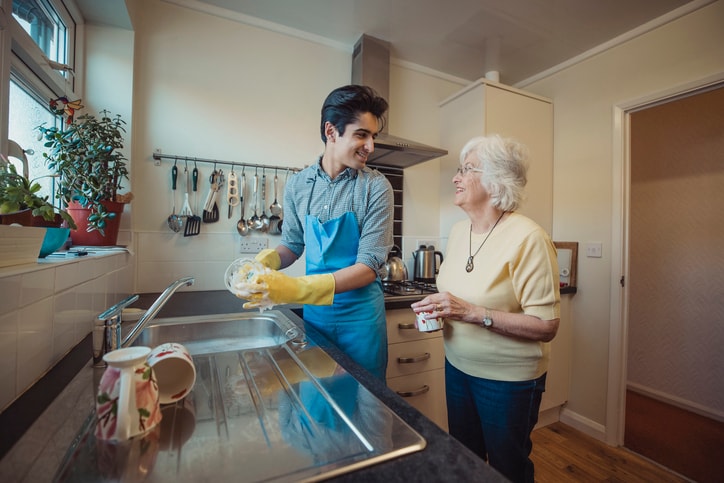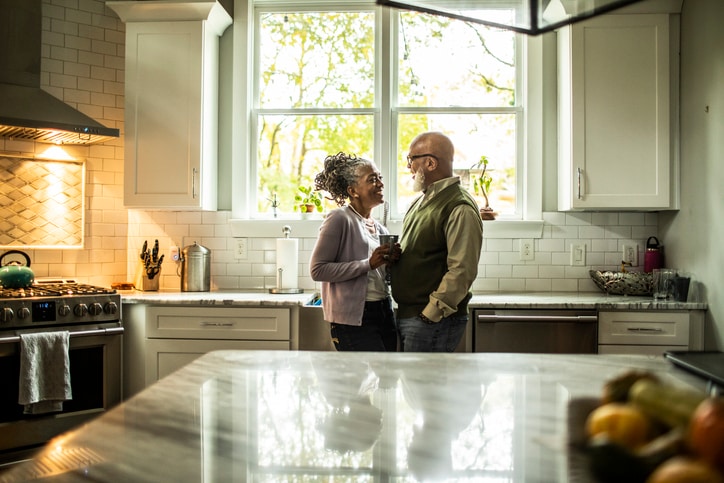By Libby Ryan
From mahjong tournaments to swing dancing lessons to virtual book clubs, there’s a plethora of activities waiting for a slot in a senior’s social calendar. But as folks get older, it can become more difficult to keep up the pace — and more barriers land in their way.
It takes more “purposeful effort” to keep a healthy social life thriving through the golden years, due to limitations in mobility, communication and transportation, explains Dr. Leah Richlera board-certified psychiatrist at UMass Memorial Medical Center. And for seniors aging in place, it’s crucial to get out of the house and maintain a healthy mix of social interactions. In fact, research shows that loneliness directly affects seniors’ physical, mental and emotional wellness.
Amy Morin, a licensed clinical social worker, psychotherapist and author, notes, “Helping seniors stay social can improve their overall well-being. It’s important for their mood, their physical condition and their cognitive skills.”
And as a caregiver, you can help your aging loved one maintain a thriving social life. Here are six ways to support your aging loved ones, whether they’re the life of every party or need to take things a bit slower than they used to.
“Helping seniors stay social can improve their overall well-being. It’s important for their mood, their physical condition and their cognitive skills.”
— AMY MORIN, A LICENSED CLINICAL SOCIAL WORKER, PSYCHOTHERAPIST AND aUTHOR
1. Consider post-pandemic changes
Many universities, gyms or community centers that offered fitness courses or continuing education opportunities that your aging loved one might have taken advantage of changed class schedules during the pandemic. That can make it difficult for seniors to jump right back into their old routines, especially if your loved one isn’t comfortable using the internet to research what’s out there.
Consider taking on some of the research yourself. “Contacting local senior centers and reaching out to local libraries can be a great way to assess available activities and support,” suggests Dr. Richler. Dance studios, faith groups, community gardens, historical societies and others also might have new or newly reopened group activities seniors can join.
Don’t know where to start? The AARP website offers a list of events for seniors in their area. Just put in the zip code where your senior loved one lives and pick from AARP events and local community activities (both virtual and in-person).
2. Offer to help them find transportation
Transportation can become an issue if a senior is no longer driving, points out Morin. So one of the best and easiest things family members can do is to offer to drive them to community meetings, card games or even a cooking class. If you can’t personally get behind the wheel, you can use ridesharing services to order a ride — even if your loved one doesn’t have ridesharing apps on their phones.
And if seniors rely on public transportation, remember to check in to see if buses and trains are still easily accessible for them as their mobility changes.
If your aging loved one isn’t able to use local public transportation due to difficulty walking to bus stops, climbing stairs for subways or generally navigating multiple transit lines, consider these alternatives:
- Public paratransit services can be arranged to pick them up at their home.
- Some cities have specific transit options that offer shuttles to take seniors to museums, theater shows or other activities.
- Check your local transit authority’s “mobility management” options or even see if local religious groups offer volunteer driving helpers.
And if your loved one can’t drive, there’s a good chance their peers are also struggling with transportation.
“If they have friends who live close, you might offer to pick them up or take them on an outing so they can get together,” suggests Morin. Consider offering to chauffeur to your senior loved one’s best bud — or maybe recruit other caregivers to create a carpool for the whole friend group. You can alternate driving responsibilities on a schedule so you share the load and everyone gets to bridge club safely.
3. Be tech support
Thankfully for homebound seniors, there are more online options for clubs and classes than ever. Even longstanding organizations offer virtual opportunities to get involved, such as the American Birding Association or The Red Hat Society. And seniors can choose more niche communities on social networking site Meetup and join virtual hangouts to connect with fellow landscape painters or cruise lovers.
But while some seniors might be totally at ease setting up video calls, it’s important to remember some might struggle to master the technology, says Dr. Richler. It can be helpful to have a helper on hand to help get seniors set up before any (or maybe even all) Zoom sessions.
Younger folks might not realize just how much of modern life requires high levels of digital proficiency. Facebook events or Evites require online RSVPs, and many gyms or wellness studios use apps to reserve classes. So if your senior loved one is an avid foxtrotter at the local ballroom dance studio, you can offer to help book their sessions or walk them through using the tech.
4. Help them with any changing abilities
For seniors facing changes in their mobility, social activities can become more difficult — even formerly simple maneuvers like circulating around a room to chat with different attendees. Morin suggests caretakers go along with seniors to any new activities to lend a helping hand, boost their confidence and help overcome potential physical obstacles, such as getting out of a chair or moving around a room.
“For those who are losing hearing or experiencing vision trouble, phone calls or video chats become much more difficult,” she adds.
You can assist by:
- Providing hearing or visual aids, such as installing subtitle technology or text reader applications.
- Subtitles can be set as the default for streaming services and, for video calls, Skype offers closed captioning (you can add subtitles to be the default for all calls for seamless use).
- If your senior loved one uses an iPhone, iPad or Mac computer, Apple has built-in technology that will both read text out loud and even describe images. For Android users, you can use Google’s TalkBack.
5. Facilitate a virtual option
If seniors can no longer physically go to see a movie with a pal, Morin recommends coordinating a virtual watch party. You can help set up all the technology required, such as the Teleparty plugin that allows multiple people to watch the same program on Netflix at the same time.
And for the bookworms, a virtual book club can be a great option. Morin also suggests a book exchange so that seniors can still be aware of what their friends are reading and can discuss — without the pressure to finish a whole novel on the formal schedule of a book club. If literary friends don’t live close enough to physically pass books between each other, you can help create a snail mail book train where each senior sends their most recent read on to a fellow book lover. You can help with the book shopping, shipping or simply collecting the list of addresses of eager readers.
6. Keep up with social dynamics
As folks get older, their same-age peers may move to residential settings or go live elsewhere with family, says Morin. So seniors might find their social circles in flux, even if their own circumstances remain the same. It’s important to listen to how your senior loved one talks about their friends and if they have any upcoming life changes. When these changes happen, it can be a good opportunity to get a professional involved to process the emotions or cope with losses in therapy.
And if their friends in the area begin to dwindle, you can be ready to help them stay in touch with long-distance pals by arranging regular FaceTime dates or even writing letters for a comforting dose of nostalgia.Ultimately, you’ll want to pay special attention when seniors express feeling lonely or isolated, says Dr. Richler. In turn, you can help validate and normalize their feelings — and help them find new opportunities to get out there and be social.
Libby Ryan is a freelance journalist and editor covering health, culture and travel.





